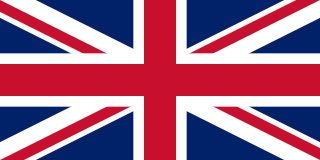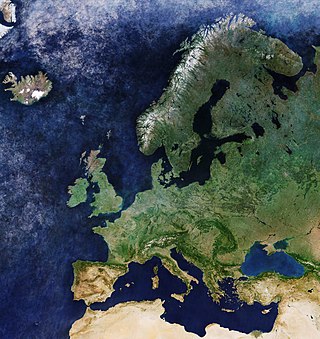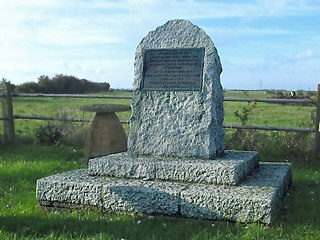Related Research Articles

England became inhabited more than 800,000 years ago, as the discovery of stone tools and footprints at Happisburgh in Norfolk have indicated. The earliest evidence for early modern humans in Northwestern Europe, a jawbone discovered in Devon at Kents Cavern in 1927, was re-dated in 2011 to between 41,000 and 44,000 years old. Continuous human habitation in England dates to around 13,000 years ago, at the end of the Last Glacial Period. The region has numerous remains from the Mesolithic, Neolithic and Bronze Age, such as Stonehenge and Avebury. In the Iron Age, all of Britain south of the Firth of Forth was inhabited by the Celtic people known as the Britons, including some Belgic tribes in the south east. In AD 43 the Roman conquest of Britain began; the Romans maintained control of their province of Britannia until the early 5th century.

Jacobitism was a political movement that supported the restoration of the senior line of the House of Stuart to the British throne. The name derives from the first name of James II of England, which is rendered in Latin as Jacobus. When James went into exile after the November 1688 Glorious Revolution, the Parliament of England argued that he had abandoned the English throne, which they offered to his Protestant daughter Mary II of England, and her husband William III. In April, the Scottish Convention held that he "forfeited" the throne of Scotland by his actions, listed in the Articles of Grievances.

The United Kingdom of Great Britain and Northern Ireland, commonly known as the United Kingdom (UK) or Britain, is an island country in Northwestern Europe, off the north-western coast of the continental mainland. It comprises England, Scotland, Wales, and Northern Ireland. It includes the island of Great Britain, the north-eastern part of the island of Ireland, and most of the smaller islands within the British Isles. Northern Ireland shares a land border with the Republic of Ireland; otherwise, the United Kingdom is surrounded by the Atlantic Ocean, the North Sea, the English Channel, the Celtic Sea and the Irish Sea. The total area of the United Kingdom is 93,628 square miles (242,495 km2), with an estimated 2023 population of over 68 million people.

The monarchy of the United Kingdom, commonly referred to as the British monarchy, is the constitutional form of government by which a hereditary sovereign reigns as the head of state of the United Kingdom, the Crown Dependencies and the British Overseas Territories. The current monarch is King Charles III, who ascended the throne on 8 September 2022, upon the death of his mother, Queen Elizabeth II.

The Kingdom of England was a sovereign state on the island of Great Britain from 12 July 927, when it emerged from various Anglo-Saxon kingdoms, until 1 May 1707, when it united with Scotland to form the Kingdom of Great Britain, and England is now part of the United Kingdom. The Kingdom of England was among the most powerful states in Europe during the medieval and early modern colonial periods.

Welsh nationalism emphasises and celebrates the distinctiveness of Welsh culture and Wales as a nation or country. Welsh nationalism may also include calls for further autonomy or self-determination, which includes Welsh devolution, meaning increased powers for the Senedd, or full Welsh independence.

Wales in the Late Middle Ages spanned the years 1282–1542, beginning with conquest and ending in union. Those years covered the period involving the closure of Welsh medieval royal houses during the late 13th century, and Wales' final ruler of the House of Aberffraw, the Welsh Prince Llywelyn II, also the era of the House of Plantagenet from England, specifically the male line descendants of Geoffrey Plantagenet, Count of Anjou as an ancestor of one of the Angevin kings of England who would go on to form the House of Tudor from England and Wales.
Events from the 1070s in England.

The formation of the United Kingdom of Great Britain and Northern Ireland has involved personal and political union across Great Britain and the wider British Isles. The United Kingdom is the most recent of a number of sovereign states that have been established in Great Britain at different periods in history, in different combinations and under a variety of polities. Historian Norman Davies has counted sixteen different states over the past 2,000 years.

The military history of the United Kingdom covers the period from the creation of the united Kingdom of Great Britain, with the political union of England and Scotland in 1707, to the present day.
The military history of England and Wales deals with the period prior to the creation of the United Kingdom of Great Britain in 1707.(for the period after 1707 see Military history of the United Kingdom)

The Jacobite rising of 1745, also known as the Forty-five Rebellion or simply the '45, was an attempt by Charles Edward Stuart to regain the British throne for his father, James Francis Edward Stuart. It took place during the War of the Austrian Succession, when the bulk of the British Army was fighting in mainland Europe, and proved to be the last in a series of revolts that began in 1689, with major outbreaks in 1708, 1715 and 1719.

Invasions of the British Isles have occurred throughout history. Various sovereign states within the territorial space that constitutes the British Isles have been invaded several times, including by the Romans, by the Germanic peoples, by the Vikings, by the Normans, by the French, and by the Dutch.
The term invasion of England may refer to the following planned or actual invasions of what is now modern England, successful or otherwise.

The Great British Story: A People's History is a 2012 documentary in eight parts written and presented by Michael Wood looking at history through the eyes of ordinary people airing on the BBC.

There are several contenders for the title of last battle on British or English soil, depending largely on how one defines battle and how one classifies various events.
This is a timeline of the 18th century.
The following outline is provided as an overview of and topical guide to the history of the British Isles:
References
- ↑ "Julius Caesar's First Landing in Britain | History Today". www.historytoday.com. Retrieved 2017-04-15.
- ↑ "BBC – History – Overview: Roman Britain, 43 – 410 AD" . Retrieved 2017-04-15.
- ↑ "The Caledonian Campaigns of Septimius Severus". www.dot-domesday.me.uk. Retrieved 2017-04-15.
- ↑ "Carausian Revolt". World News. Retrieved 2017-04-15.
- ↑ Huerta, Carlos (2016). The Great Conspiracy: Britain's Secret War against Revolutionary France, 1794-1805. Amberley Publishing. ISBN 9781445659480.
- ↑ "Anglo Saxon England". faculty.history.wisc.edu. Retrieved 2017-04-15.
- ↑ "Ivar the Boneless and the Great Heathen Army". Spangenhelm. 2016-11-14. Retrieved 2017-04-15.
- ↑ "Cnut's invasion of England: setting the scene for the Norman conquest". History Extra. Retrieved 2017-04-15.
- ↑ "The Norman Conquest of England". www.historic-uk.com. Retrieved 2017-04-15.
- ↑ Ross, David. "The Norman Invasion of Wales | History of Wales". Britain Express. David Ross. Retrieved 2017-04-15.
- ↑ "The Revolt of the Earls 1075". www.allabout1066.net. Retrieved 2017-04-15.
- ↑ "The Rebellion of 1088". World history. Retrieved 2017-04-15.
- ↑ King, Edmund (1994). The Anarchy of King Stephen's Reign. Oxford Scholarship Online. ISBN 9780198203643.
- ↑ "Medieval Sourcebook: Roger of Hoveden: The Revolt of 1173-74, from The Chronicle". sourcebooks.fordham.edu. Retrieved 2017-04-15.
- ↑ Bastable, Jonathan (September 2011). The British at War (Amazing and Extraordinary Facts). David & Charles. ISBN 978-0715338995.
- ↑ "TimeRef – Medieval and Middle Ages History Timelines – The First Barons' War". www.timeref.com. Retrieved 2017-04-15.
- ↑ "2nd Barons' War". Magna Carta Trust 800th Anniversary. The Magna Carta Trust. 2014-05-23. Retrieved 2017-04-15.
- ↑ "The English invasion of Wales". www.historic-uk.com. Retrieved 2017-04-15.
- ↑ "The First Scottish War of Independence". www.allempires.com. Retrieved 2017-04-15.
- ↑ Warner, Kathryn (2014), Edward II: The Unconventional King, Amberley Publishing
- ↑ MacInnes, Iain (2016). Scotland's Second War of Independence, 1332-1357. Boydell Press. ISBN 9781783271443.
- ↑ "Peasants Revolt". History Learning Site. Retrieved 2017-04-15.
- ↑ "BBC Wales – History – Themes – Chapter 10: The revolt of Owain Glyndwr". www.bbc.co.uk. Retrieved 2017-04-15.
- ↑ "9 Things You Should Know About the Wars of the Roses – History in the Headlines". history.com. Retrieved 2017-04-15.
- ↑ "The Cornish Rebellion of 1497". History Learning Site. Retrieved 2017-04-15.
- ↑ "Mary Queen of Scots - The 'Rough Wooing': 1544-48". www.bbc.co.uk. Retrieved 2017-04-15.
- ↑ "The Prayer Book Rebellion 1549". www.tudorplace.com.ar. Retrieved 2017-04-15.
- ↑ Simkin, John (September 1997). "Kett Rebellion". Spartacus Educational. Retrieved 2017-04-15.
- ↑ "The Northern Rebellion 1569". www.tudorplace.com.ar. Retrieved 2017-04-15.
- ↑ "Wars of the Three Kingdoms (1639-1651) genealogy project". geni_family_tree. Retrieved 2017-04-15.
- ↑ fletcherconsult, The Battlefields Trust, Craig Fletcher, Christopher Jones. "UK Battlefields Resource Centre – Viking – Monmouth's Rebellion". www.battlefieldstrust.com. Retrieved 2017-04-15.
{{cite web}}: CS1 maint: multiple names: authors list (link) - ↑ "The First Jacobite Rebellion, 1715". Britain Express. Retrieved 2017-04-15.
- ↑ Archives, The National. "Jacobite Rising of 1745 - The National Archives". The National Archives. Retrieved 2017-04-15.